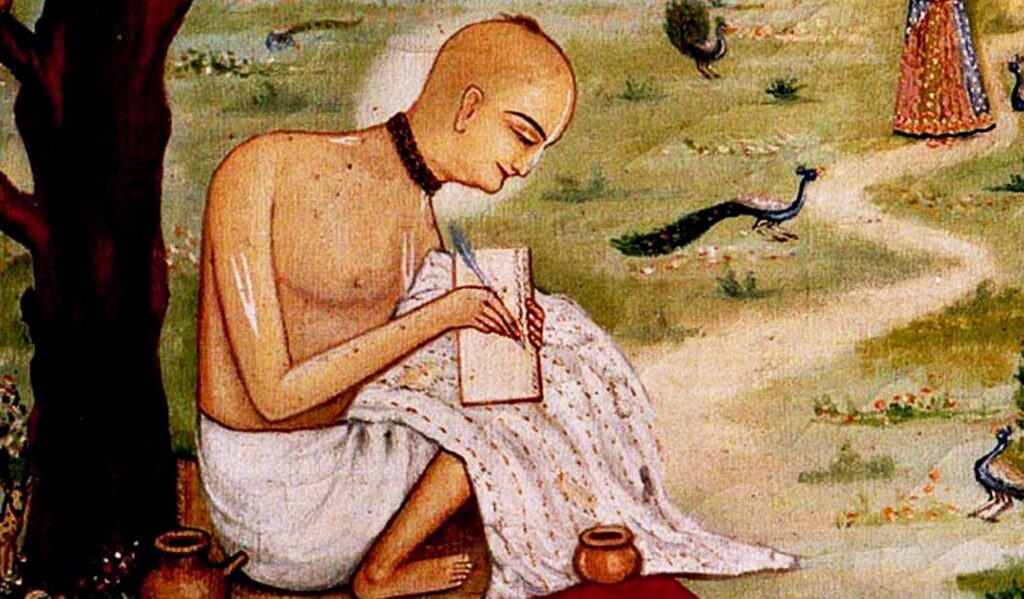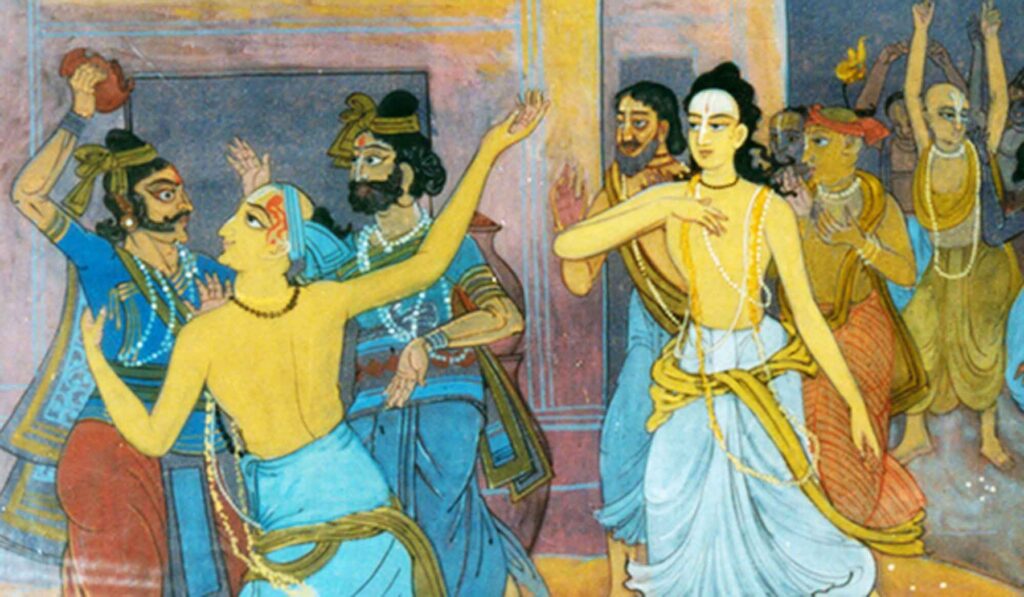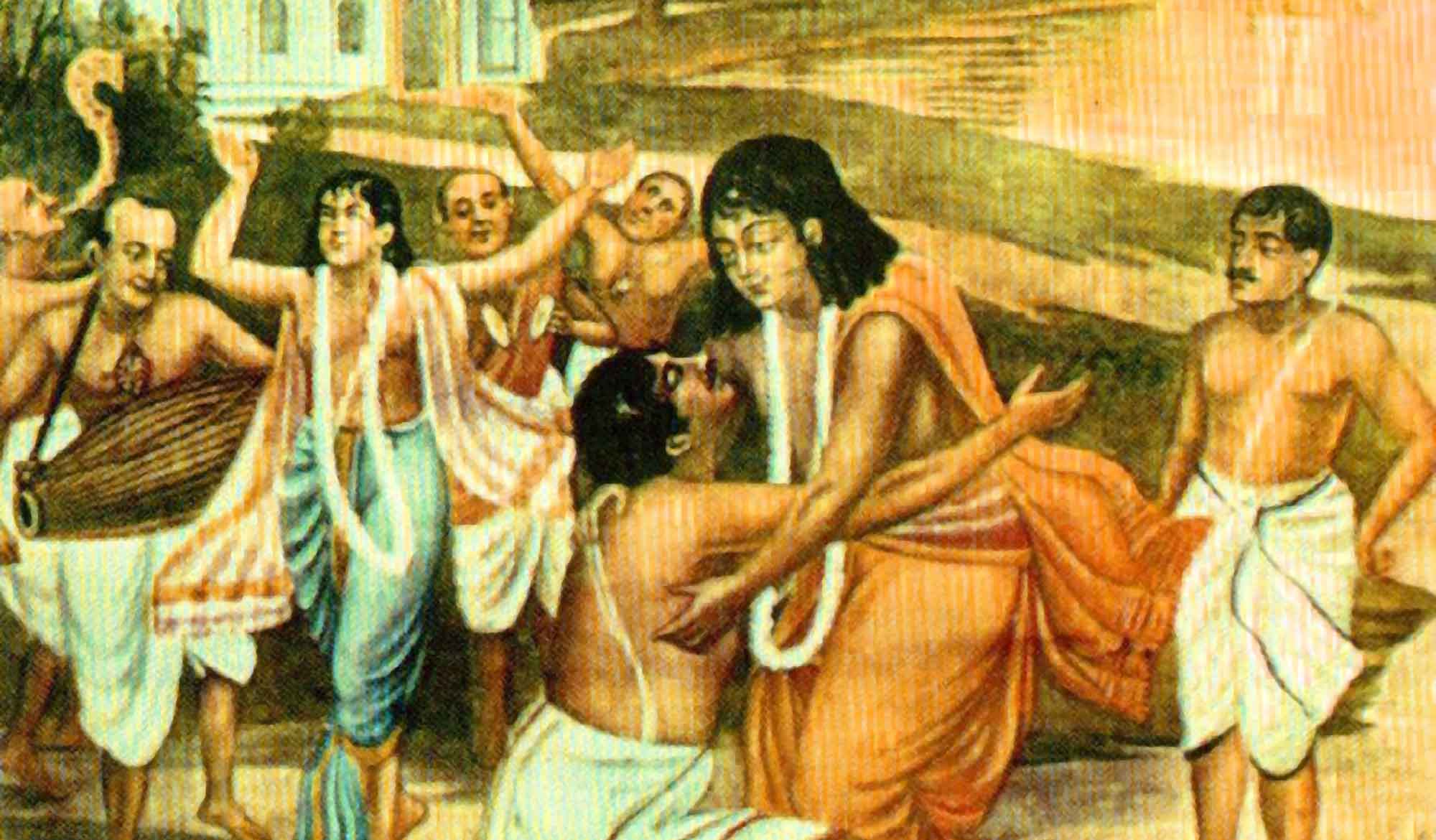Overview
Kuṭīnāṭī (Politics and Duplicity) was published in 1894, in two parts in Sajjana Toṣaṇī, Vol. 6, issues 3 and 7. In this essay, Bhaktivinoda Ṭhākura explains the meaning of kuṭīnāṭī according to the philosophy of Śrī Caitanya and also speaks about the verse from Gītā, ‘api cet suduracāro’ in relation to kuṭīnāṭī.
(translated by Swami B.V. Giri)
In Śrī Śrīman Mahāprabhu’s instructions, He has especially advised giving up kuṭīnāṭī. In this way, He has accepted that committing forbidden activities, violence towards jīvas and the desire for prestige, which are obstacles to bhakti, are included within kuṭīnāṭī. Elsewhere, He has given the following advice:
ataeva gṛhe tumi kṛṣṉa-bhaja giyā
kuṭīnāṭī parihari’ ekānta haiyā
(“Therefore, go to your home and worship Kṛṣṇa with all attention, giving up duplicity.”- Caitanya-bhāgavata, Ādi 14.142)
Furthermore, Śrī Dāsa Gosvāmī himself has written the śloka, kuṭīnātī bhara khara kṣaran mūtre snātvā etc. (‘bathing in the burning urine of the great donkey of kuṭīnāṭī’) and from these words we can understand that it is extremely detrimental for attaining prema for Rādhā-Kṛṣṇa. Thus, it is extremely necessary for pure Vaiṣṇavas to completely reject kuṭīnāṭī.
What is the meaning of the word kuṭīnāṭī? The meaning of the word cannot be found in the dictionary. The term is always used amongst women in Bengali society. We are discussing the meaning of the place where the word kuṭīnāṭī is used, and we are writing the word kuṭīnāṭī to convey the meaning of the word as used by the people of Śrī Navadvīpa-maṇḍala. The phrase kuṭīnāṭī has two words – kuṭī and nāṭī. Some people who have a mania about purity, look at everything as ku (contaminated), for example, they bathe in a pond but nearby there is a field for passing stool, so they continuously think about how bad the pond is and are busy discussing this all day. They cannot speak about any good topics. This obsession with purity is one type of kuṭīnāṭī. Those who are affected by this kind of mania cannot consider any part of the world as pure, they cannot consider anyone to be pure at any time, and they cannot accept any person to be a pure Vaiṣṇava. When they see the activities of a pure devotee, which are opposed to the Smārtas, they do not consider him to be a Vaiṣṇava. At this point, kuṭī (considering everything as bad) comes first, and then naṭī (rejection) appears.
To not accept the prasāda of the mūrti of Bhagavān installed by sādhus of a lower caste is also an example of kuṭīnāṭī. While kuṭīnāṭī is strong, one can never achieve satisfaction simply from eating. Kuṭīnāṭī is a type of mental disease. While this disease remains it is very difficult to attain bhakti for Kṛṣṇa. Why is it so difficult for one who is influenced by kuṭīnāṭī to serve and associate with the Vaiṣṇavas?
kṛṣṇera ucchiṣṭa haya mahā-prasāda nāma
bhakta-śeṣa haile mahā-mahā-prasādākhyāna
bhakta-pada-dhūli āra bhakta-pada-jala
bhakta-bhukta-avaśeṣa—tina mahā-bala
(“The remnants offered to Kṛṣṇa is called mahā–prasādam. After it has been taken by a devotee, it is known as mahā–mahā–prasādam. The dust from the feet of a devotee, the water that has washed a devotee’s feet and the remnants of his food – these three have great potency.” – Caitanya-caritāmṛta, Antya-līlā 16.59-60)
Those affected by kuṭīnāṭī, who suffer from pride stemming from caste or material beauty, do not have firm faith in mahā–mahā–prasādam, the dust from the feet of a devotee, or the water that has washed a devotee’s feet. They are always guilty of vaiṣnava-aparādha and nāma-aparādha, therefore their mouths find it extremely difficult to chant hari–nāma. There are some people who show their hatred at a time when pure Vaiṣṇavas are suffering, but Mahāprabhu says, “O Sanātana! A Vaiṣṇava will not hate you simply because you have sores on your body.”
bhadrābhadra-vastu-jñāna nāhika prākṛte
(“There is nothing in the material world that one should consider as good or bad.”- Caitanya-caritāmṛta, Antya-līlā 4.174)
dvaite bhadrābhadra-jñāna saba mano-dharma
ei bhāla ei manda ei saba bhrama
(“The dual conceptions of good and bad are all due to the nature of the mind. Thinking that ‘This is good’ or ‘This is bad’ is all false.” – Caitanya-caritāmṛta, Antya-līlā 4.176)
prabhu kahe vaiṣṇava deha prākṛta kabhu naya
aprākṛta deha bhaktera cidānandamaya
(“The Lord said: A Vaiṣṇava’s body is never material. His body is spiritual and full of spiritual bliss.” – Caitanya-caritāmṛta, Antya-līlā 4.191)
Mahāprabhu has explained the meaning of the word ‘kuṭīnāṭī’ with the phrase, ‘ei bhāla ei manda’ (‘this is good and this is bad’). It is vaiṣṇava-aparādha to think that any deformity in the body of a Vaiṣṇava is abhadra (inauspicious). Even if one observes a Vaiṣṇava perform some particular evil practice that goes against the Vaiṣṇava smṛti-śāstra, he must still be considered a sādhu, otherwise it will be a nāma-aparādha according to the Bhagavad-gītā.
api cet su-durācāro bhajate mām ananya-bhāk
sādhur eva sa mantavyaḥ samyag vyavasito hi saḥ
(“Even if one commits abominable actions, if he is engaged in My worship without deviation, he must certainly be considered as a sādhu because he is completely fixed in his determination.” – Bhagavad-gītā 9.30)
There is no provision in this that one should be considered a Vaiṣṇava if he is engaged in practices that are against bhakti. Showing contempt to pure Vaiṣṇavas, keeping bad association, i.e. illicit connections with women and keeping company with non-devotees, contempt towards the guru, criticizing the bhakti-śāstra, considering the Name and the Named (Kṛṣṇa and the Holy Name) to be different, thinking the Holy Name is equal to mundane auspicious deeds, attachment to the material body due to the concept of ‘I’ and ‘mine’ and having no love for the Holy Name, performing wicked acts on the strength of the Holy Name etc. All such anti-devotional practices that have been described here cannot be seen in someone who has attained exclusive bhakti to Śrī Kṛṣṇa. It is impossible to find such activities that are against bhakti in such an unswerving devotee. Where there is anti-bhakti, there is no bhakti! It has been prescribed to leave the company of such people. Bhakti is not attained by kuṭīnāṭī or by observing the practices of one who has bhakti that go against the smṛti-śāstra. Therefore, with special care, devotees will give up kuṭīnāṭī. Try to deliberate upon kuṭīnāṭī as much as possible so that kuṭīnāṭī does not enter the heart.













